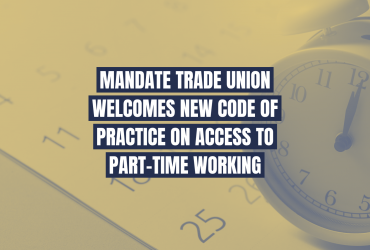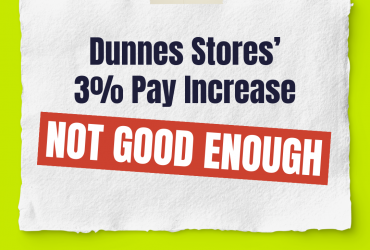€20m in pay increases won by 40,000 union members
Monday 28 April 2014Mandate say pay increases will boost domestic economy
Mandate Trade Union members have won more than €20 million in pay increases over the past 24 months, according to the unions’ General Secretary John Douglas.
Mr Douglas was speaking to 300 delegates at the Mandate Biennial Delegate Conference themed Making Work Pay in Killarney where he called for more workers to join unions so they could win pay rises and help the local economy.
He said, “Mandate members in the retail sector have been very successful in achieving higher rates of pay and better security of hours since our last conference two years ago.”
Mandate, which represents 45,000 retail and bar workers in Ireland, have won pay increases in:
- Argos – 3%
- Boots – 4%
- Brown Thomas – 2%
- Debenhams – 2%
- Dunnes Stores – 3%
- Marks & Spencer – 2.5%
- Penneys – 3%
- Superquinn (now Supervalu) – 2%
- Tesco – 4%
Mr Douglas said: “Our members spend almost all of their income in local shops, restaurants, bars and other local businesses. By winning these pay increases, Mandate members have put an extra €20m spending power into the local economy, which in turn will protect existing jobs and hopefully create more decent jobs in every community across Ireland.”
He added, “While zero hour contracts and low hour contracts are becoming the norm in the Irish economy, the vast majority of our members have achieved ‘banded hour contracts’, ensuring they have certainty of hours of employment. This, combined with the pay increases they have won, will secure a decent wage for them and their families.”
Mr Douglas, who is also the President of the Irish Congress of Trade Unions, encouraged all workers in all industries to join their union and fight for pay increases.
“Irish workers are underpaid by comparison with our European neighbours. We’re also more productive and Irish company profits are rising at a faster rate than the EU average.
“In this context, it is important that Irish workers in profitable businesses seek pay increases so we can grow the domestic economy. The only logical way they can do this is by joining a union and organising their workplaces.”
Mr Douglas went on to explain the benefits of pay increases to Irish society
“Winning pay increases in profitable enterprises will reduce poverty levels. It will increase revenue for government through extra income tax, USC, PRSI and VAT receipts, meaning we can invest in better public services. It will also mean we have more ability to pay off the odious banking debt that was thrust on Irish workers illegitimately, meaning future generations won’t have to pay as much for the banking crisis created by Ireland’s elites,” he said.
Mr Douglas told conference that in the past having a job meant a route out of poverty, but not anymore.
“At a time when 16pc of those at work are living in deprivation; when one in ten people suffer from food poverty; and 147,000 workers say they cannot get enough hours at work, the solution to our economic and social crisis is clear. Joining a trade union and collectively bargaining with your employer will always be the greatest way to ensure decent income and decent work.”
Addressing the issue of tax cuts, Mr Douglas said: “While government and employer representatives argue that tax cuts are the best way to increase domestic demand, this policy is not in the best interests of our members or lower paid workers generally.
“Low paid workers don’t earn enough money to pay income tax. They rely on social transfers like the Family Income Supplement (FIS) and they also rely on decent public services in health and in education. Cutting tax for the top 20pc or 30pc of earners will only starve our public services and widen the income inequality gap that is already far too wide.”
Mr Douglas concluded: “Our union is determined to reduce poverty levels in Irish society. We’re determined to put more spending power into our members’ pockets and we’re determined to ensure that decent work becomes the norm for the Irish workforce. We make no apologies for achieving these goals by collectively bargaining and winning pay increases for our members.”






